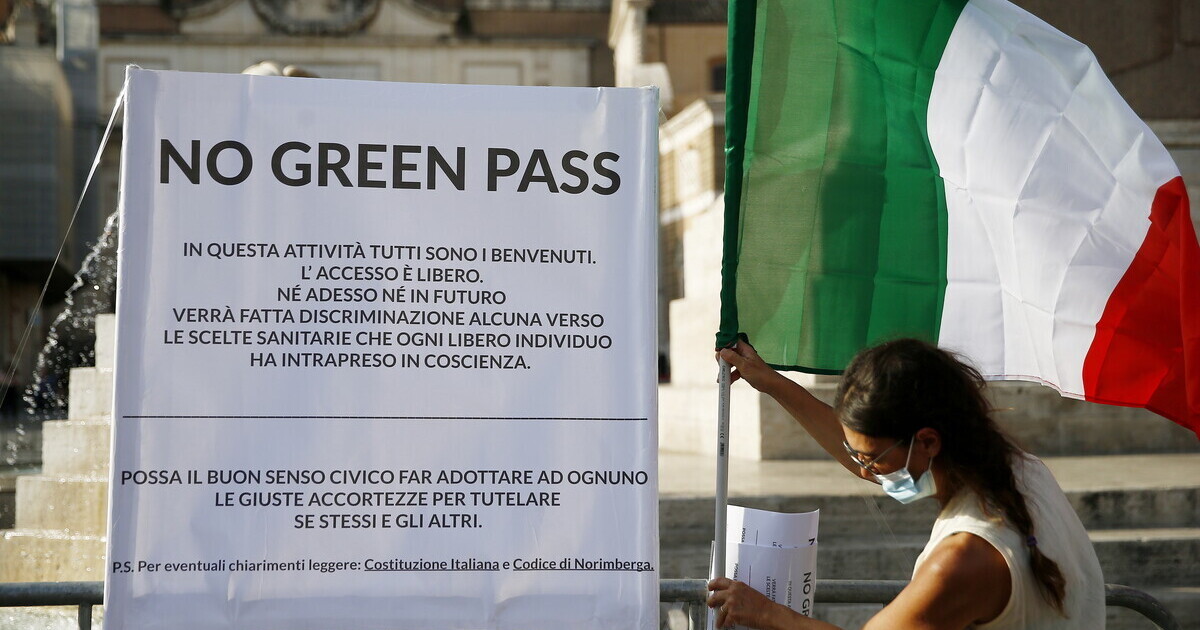
One of the first actions of Italy’s new right-wing government will be to abolish compulsory vaccination and anti-Covid passports, called green passports.
Despite initial support for the health measures, Italy’s incoming prime minister, Giorgia Meloni, has long opposed compulsory vaccination and the introduction of the Covid passport and will put these issues on her agenda when she takes office.
“In accordance with what we wrote in the party program and what we said during the election campaign, we are against the Covid passport and mandatory vaccination, because we believe it is not the way to deal with a health emergency,” explained Elisabetta Gardini. , deputy of Fratelli, Meloni’s party, on the 24 Mattino program on Radio24.

In this sense, one of the first measures of the new right-wing government will be the repeal of the previous prime minister’s decree that made vaccination compulsory for those over 50, for which thousands of Italians were fined last year, as well as the repeal of the health passport, which violates the rights of citizens.
“Coherence would be exactly to finish this chapter. We believe that there is no passport and no obligation to vaccinate. Everything related to health care should be decided personally with the doctor and not with an obligation made by a bureaucrat”, added the congresswoman.
Gardini also said that Meloni wants to set up a commission to investigate all the measures taken by the last two governments during the pandemic, that of the socialist Giuseppe Conte and that of the socialist Mario Draghi.
The latter imposed a brutal quarantine and a health passport, respectively.
“We also want a commission to evaluate everything that has been done, both economically and health-wise,” she said.
The quarantine caused millions of Italians to lose their jobs and many more to suffer health problems related to the dismantling of essential services.
Consequently, forced vaccination and the green passport violated the constitutional rights of the entire population.
The new Italian right-wing coalition has taken shape with the appointment of the presidents of the two houses: Ignazio La Russa, one of the founders of Fratelli, in the Senate and Lorenzo Fontana, Salvini’s right wing in the Lega, in the Chamber of Deputies.
La Russa’s appointment was a bitter pill for Forza leader Silvio Berlusconi, who had agreed to let him lead the Senate. Meloni, however, wanted to preserve his majority and pushed his right hand into the upper chamber.
The former prime minister called Meloni “condescending, opinionated, arrogant and insulting”, for a moment it seemed as if the coalition would fall apart.
Even after il Cavaliere’s outburst, the future prime minister replied: “I am not blackmailable” and the relationship remained in flames.
Fortunately, Berlusconi eventually agreed with Meloni.
It is said that the former president’s children had dinner with him on Sunday evening, bringing him along. “Admit that you are no longer in charge,” one of his sons is said to have told him.
The next day, he traveled to Rome for a private meeting with Meloni, where they settled their differences.
On his Twitter account, he wrote: “I met Giorgia Meloni in Rome. We are working together to give Italy as soon as possible a strong, cohesive and profiled government that knows how to deal with emergencies immediately.”
He added: “For this reason Fratelli and Forza Italia will appear together with other coalition forces in the upcoming consultations with President Sergio Mattarella. During the meeting, we took stock of the priorities that the new government should address, starting with expensive energy.”
Despite being without the presidency of the Senate, Berlusconi’s party will retain control of several ministries, according to 8% taken on September 5.
Meloni, Salvini and Berlusconi are currently negotiating intensively to draw up a list of ministers to accompany Giorgia in the first completely right-wing government in Italy’s history.
Once the list of ministers, bloc heads and other minor posts has been submitted, the approval of President Sergio Mattarella is needed to confirm the new government, a figure who, despite having a largely ceremonial role, has the power to veto ministers. and in the past has had a major influence on the composition of cabinets.



